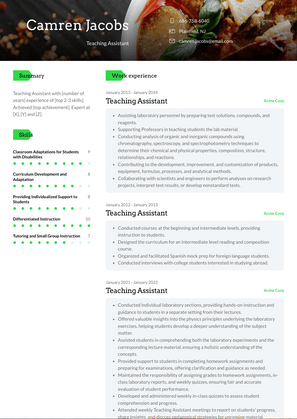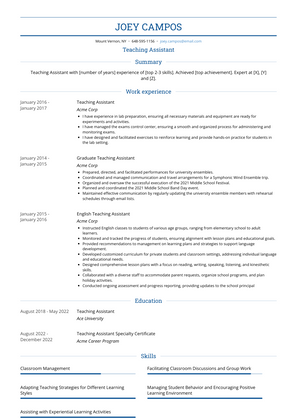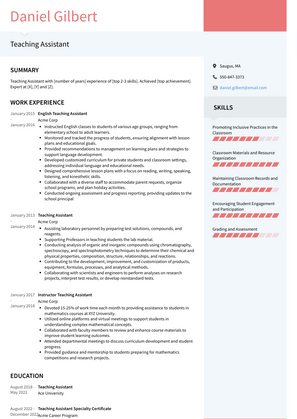Teaching Assistant Resume Examples and Templates
This page provides you with Teaching Assistant resume samples to use to create your own resume with our easy-to-use resume builder. Below you'll find our how-to section that will guide you through each section of a Teaching Assistant resume.



What Do Hiring Managers Look for in a Teaching Assistant Resume
- Classroom support and assistance to teachers.
- Academic support to students, including tutoring and guidance.
- Administrative tasks such as record-keeping and organizing materials.
- Grading assignments and providing constructive feedback.
- Communication and collaboration with teachers, staff, and parents/guardians.
How to Write a Teaching Assistant Resume?
To write a professional Teaching Assistant resume, follow these steps:
- Select the right Teaching Assistant resume template.
- Write a professional summary at the top explaining your Teaching Assistant’s experience and achievements.
- Follow the STAR method while writing your Teaching Assistant resume’s work experience. Show what you were responsible for and what you achieved as a Teaching Assistant.
- List your top Teaching Assistant skills in a separate skills section.
How to Write Your Teaching Assistant Resume Header?
Write the perfect Teaching Assistant resume header by:
- Adding your full name at the top of the header.
- Add a photo to your resume if you are applying for jobs outside of the US. For applying to jobs within the US, avoid adding photo to your resume header.
- Add your current Teaching Assistant title to the header to show relevance.
- Add your current city, your phone number and a professional email address.
- Finally, add a link to your portfolio to the Teaching Assistant resume header. If there’s no portfolio link to add, consider adding a link to your LinkedIn profile instead.
Bad Teaching Assistant Resume Example - Header Section
Joey 167 Hamilton Drive Phillipsburg, NJ 08865 Marital Status: Married, email: cooldude2022@gmail.com
Good Teaching Assistant Resume Example - Header Section
Joey Campos, Phillipsburg, NJ, Phone number: +1-555-555-5555, Link: linkedin/in/johndoe
Make sure to add a professional looking email address while writing your resume header. Let’s assume your name is John Doe - here is a formula you can use to create email addresses:
- firstnamelastname@email.com - johndoe@email.com
- firstname.lastname@email.com - john.doe@email.com
- lastname.firstname@email.com - doe.john@email.com
- f.lastname@email.com - j.doe@email.com
- l.firstname@email.com - d.john@email.com
- firstnamelastname12@email.com - johndoe12@email.com
For a Teaching Assistant email, we recommend you either go with a custom domain name (john@johndoe.com) or select a very reputed email provider (Gmail or Outlook).
How to Write a Professional Teaching Assistant Resume Summary?
Use this template to write the best Teaching Assistant resume summary: Teaching Assistant with [number of years] experience of [top 2-3 skills]. Achieved [top achievement]. Expert at [X], [Y] and [Z].
How to Write a Teaching Assistant Resume Experience Section?
Here’s how you can write a job winning Teaching Assistant resume experience section:
- Write your Teaching Assistant work experience in a reverse chronological order.
- Use bullets instead of paragraphs to explain your Teaching Assistant work experience.
- While describing your work experience focus on highlighting what you did and the impact you made (you can use numbers to describe your success as a Teaching Assistant).
- Use action verbs in your bullet points.
Teaching Assistant Resume Example
Teaching Assistant
- Developed comprehensive lesson plans incorporating interactive learning technologies to enhance student engagement and comprehension.
- Mentored and provided individualized support to students and small groups, addressing their unique learning needs and fostering a positive learning environment.
- Assessed student progress through various evaluation methods and provided regular reports to parents and school administration.
- Successfully improved the academic performance and overall development of two students with special needs through personalized instruction and targeted interventions.
Teaching Assistant Resume Example
Teaching Assistant
- Prepared weekly tutorial folders for all course tutors, ensuring comprehensive and organized materials for a large cohort of students.
- Marked and provided feedback on student assignments, promoting academic growth and development.
- Supported students with individual needs, offering guidance and assistance to enhance their understanding of course material.
- Cultivated a stimulating and engaging learning environment, particularly for students new to the university, fostering their interest in statistics and encouraging active participation.
- Demonstrated a strong passion for and solid background in statistics, while maintaining a high level of commitment and professionalism in all aspects of the role.
Teaching Assistant Resume Example
Teaching Assistant
- Conducted individual laboratory sections, providing hands-on instruction and guidance to students in a separate setting from their lectures.
- Offered valuable insights into the physics principles underlying the laboratory exercises, helping students develop a deeper understanding of the subject matter.
- Assisted students in comprehending both the laboratory experiments and the corresponding lecture material, ensuring a holistic understanding of the concepts.
- Provided support to students in completing homework assignments and preparing for examinations, offering clarification and guidance as needed.
- Maintained the responsibility of assigning grades to homework assignments, in-class laboratory reports, and weekly quizzes, ensuring fair and accurate evaluation of student performance.
- Developed and administered weekly in-class quizzes to assess student comprehension and progress.
- Attended weekly Teaching Assistant meetings to report on students' progress, share insights, and discuss pedagogical strategies for upcoming material.
Research and Teaching Assistant Resume Example
Research and Teaching Assistant
- Prepared and delivered practical teaching sessions, providing students with hands-on learning experiences and guiding them through various laboratory exercises.
- Provided ongoing supervision and support to students during their hospital placements, ensuring they received appropriate guidance and mentoring.
- Set and marked assignments, assessing students' work and providing constructive feedback to facilitate their learning and development.
- Assisted teaching staff and students in their research projects, offering guidance on research methodologies, data analysis, and literature reviews.
- Gained valuable research experience through active involvement in research projects, including data collection, analysis, and interpretation.
Graduate Research and Teaching Assistant Resume Example
Graduate Research and Teaching Assistant
- Collected and managed various biological datasets, ensuring data integrity and accuracy.
- Mentored and guided a large cohort of students in hypothesis-driven A/B testing and data analysis using R and Excel, providing them with valuable skills in data manipulation and statistical analysis.
- Successfully secured significant funding through competitive grants, totaling over $100,000, demonstrating strong grant writing and proposal development skills.
- Collaborated with interdisciplinary research teams to design and implement data collection protocols, ensuring adherence to ethical guidelines and research standards.
- Conducted comprehensive data analysis and interpretation, generating impactful insights and contributing to numerous scientific publications and presentations.
English Language Teaching Assistant Resume Example
English Language Teaching Assistant
- Developed English curriculum in coordination with each of the middle school teachers.
- Executed the lessons we developed in each class two to three times weekly for grades 6 through 8.
- Prepared cultural activities for the school in coordination with other school administrators throughout the year.
- Assisted with before and after-school activities, translated documents for the school district, and provided academic support to middle school students.
Instructor Teaching Assistant Resume Example
Instructor Teaching Assistant
- Devoted 15-25% of work time each month to providing assistance to students in mathematics courses at XYZ University.
- Utilized online platforms and virtual meetings to support students in understanding complex mathematical concepts.
- Collaborated with faculty members to review and enhance course materials to improve student learning outcomes.
- Attended departmental meetings to discuss curriculum development and student progress.
- Provided guidance and mentorship to students preparing for mathematics competitions and research projects.
Teaching Assistant Resume Example
Teaching Assistant
- I have experience in lab preparation, ensuring all necessary materials and equipment are ready for experiments and activities.
- I have managed the exams control center, ensuring a smooth and organized process for administering and monitoring exams.
- I have designed and facilitated exercises to reinforce learning and provide hands-on practice for students in the lab setting.
English Teaching Assistant Resume Example
English Teaching Assistant
- Instructed English classes to students of various age groups, ranging from elementary school to adult learners.
- Monitored and tracked the progress of students, ensuring alignment with lesson plans and educational goals.
- Provided recommendations to management on learning plans and strategies to support language development.
- Developed customized curriculum for private students and classroom settings, addressing individual language and educational needs.
- Designed comprehensive lesson plans with a focus on reading, writing, speaking, listening, and kinesthetic skills.
- Collaborated with a diverse staff to accommodate parent requests, organize school programs, and plan holiday activities.
- Conducted ongoing assessment and progress reporting, providing updates to the school principal
Graduate Teaching Assistant Resume Example
Graduate Teaching Assistant
- Prepared, directed, and facilitated performances for university ensembles.
- Coordinated and managed communication and travel arrangements for a Symphonic Wind Ensemble trip.
- Organized and oversaw the successful execution of the 2021 Middle School Festival.
- Planned and coordinated the 2021 Middle School Band Day event.
- Maintained effective communication by regularly updating the university ensemble members with rehearsal schedules through email lists.
Teaching Assistant Resume Example
Teaching Assistant
- Assisting laboratory personnel by preparing test solutions, compounds, and reagents.
- Supporting Professors in teaching students the lab material.
- Conducting analysis of organic and inorganic compounds using chromatography, spectroscopy, and spectrophotometry techniques to determine their chemical and physical properties, composition, structure, relationships, and reactions.
- Contributing to the development, improvement, and customization of products, equipment, formulas, processes, and analytical methods.
- Collaborating with scientists and engineers to perform analyses on research projects, interpret test results, or develop nonstandard tests.
Teaching Assistant Resume Example
Teaching Assistant
- Conducted courses at the beginning and intermediate levels, providing instruction to students.
- Designed the curriculum for an intermediate level reading and composition course.
- Organized and facilitated Spanish mock prep for foreign language students.
- Conducted interviews with college students interested in studying abroad.
Top Teaching Assistant Resume Skills for 2023
- Classroom Management
- Lesson Planning and Preparation
- Curriculum Development and Adaptation
- Grading and Assessment
- Individualized Education Plans (IEPs)
- Differentiated Instruction
- Classroom Technology Integration
- Student Progress Monitoring and Reporting
- Behavior Management Strategies
- Tutoring and Small Group Instruction
- Special Education Support
- Data Analysis and Evaluation
- Academic Support and Remediation
- Classroom Adaptations for Students with Disabilities
- Lesson Delivery and Presentation
- Classroom Materials and Resource Organization
- Parent-Teacher Communication
- Classroom Observation and Feedback
- Collaborative Teaching with Lead Teachers
- Instructional Support for English Language Learners (ELL)
- Assisting with Experiential Learning Activities
- Facilitating Classroom Discussions and Group Work
- Supervising and Assisting with Assessments and Tests
- Providing Individualized Support to Students
- Managing Student Behavior and Encouraging Positive Learning Environment
- Assisting with Classroom Technology and Multimedia Resources
- Maintaining Classroom Records and Documentation
- Providing Feedback on Student Work
- Supporting Students with Study Skills and Organization
- Promoting Inclusive Practices in the Classroom
- Supporting Students with Special Needs (e.g., ADHD, Autism)
- Utilizing Assistive Technology for Students with Disabilities
- Collaborating with Other Teaching Assistants and Support Staff
- Adapting Teaching Strategies for Different Learning Styles
- Classroom Safety and Emergency Procedures
- Encouraging Student Engagement and Participation
- Differentiating Instruction for Gifted and Talented Students
- Supporting Students with Behavioral Challenges
How Long Should my Teaching Assistant Resume be?
Your Teaching Assistant resume length should be less than one or two pages maximum. Unless you have more than 25 years of experience, any resume that’s more than two pages would appear to be too long and risk getting rejected.
On an average, for Teaching Assistant, we see most resumes have a length of 2. And, that’s why we advise you to keep the resume length appropriate to not get rejected.
Copyright ©2025 Workstory Inc.
